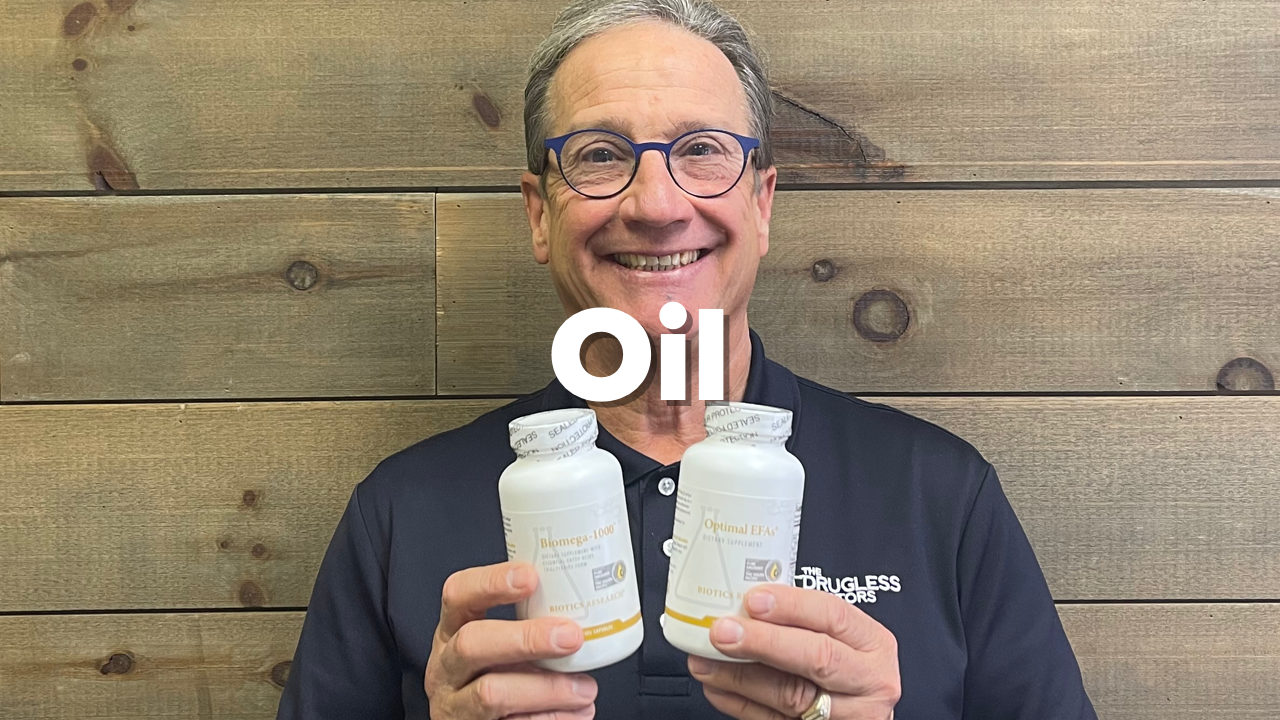What Oils Are Best for You?
/What Oils Are Best for You?
Hello, Everyone!
Did you know that oils are essential?
Many people don't like to put oils in their bodies because they think it's going to make them fat, they're going to have a heart attack, or some other adverse health response will happen.
But you know what?
Oil's vital for your brain. Your brain's made up of fat. Your body sends messages along a nerve called the myelin sheath. So that's how your body sends information. Now there are many different types of oils, and we want to give you a brief understanding of the different ones we use in our practice. The main oils we're going to talk about today are omega-6 and omega-3 fats.
We're going to start by using and discussing omega-3 oils. Now, there're two ways to make omega-3 oil for the body.
Number One: you eat food, like green beans, walnuts, and flax seeds. Those foods need to go through steps, becoming something called long-chain fat. One of the long-chain fats is called EPA for the heart; the other is DHA for your brain. So let's go over this again. You can get food or get items to make omega-3 oils by going through steps, plant-based. These also need cofactors like B6, magnesium, and zinc. So many people reading this blog right now might have health issues because you're eating well and you're proud of yourself. However, if you eat walnuts and green beans, which is fantastic, but you're still eating sugar, that sugar will sabotage your body's ability to make the launching fat EPA is heart, DHA is the brain.
Now, these fats go on to become something called prostaglandin. Prostaglandins take away the pain. So when you hear Dr. Bob, Dr. Casen, or Dr. Anthony talk about what you're eating, we know that most of you reading this right now are in the office; if you deviate from your diet, you can have chronic pain that will not go away. Now, another way to make these, or have these, omega-3 fats in your body is from a direct marine source. We use Biomega-1000, Biomega-500. These are sourced from anchovies and sardines.
You could say, "Why do they use that?"
Because they're smaller fish, they're not impacted by toxicity like some larger fish. We're not telling you what fish to use, but you want to use fish from a pure source. The Omega-1000 is 1000 milligrams of oil, and the Omega-500 is 500. Most of you should be taking at least one of these every day, but maybe you have digestive distress when you take one. Should you start with possibly taking a 500? I think it's a good idea to take them before you go to bed at night. So in case you do have digestive distress, it might not bother you.
Also good to know that we can test you for your omega oils. We use the Omega Test, and it's a straightforward test. It's probably an excellent thing to do if you have a history of anxiety, depression, or a family member with Alzheimer's or dementia.
Dr. Bob wrote a book on ADHD over 20 years ago; The rules don't change. So we could tell you if you're concerned that you might have Alzheimer's or dementia, you're going to want to do the Omega Test. And if your DHA level is low, let's just cut to the chase. If your DHA level is down, you're going to have some health challenges.
On the other hand, the EPA is essential for heart health. So we could have somebody that has a high risk for heart health because they have low EPA. It's called eicosapentaenoic acid. EPA's for heart, DHA for the brain. When these oils are done in your body, they make a prostaglandin. Takes away the pain. Like when you use flax oil and go through steps, it also helps take away the pain.
So in the office, one of the flaxes that we use is from Omega Nutrition, a great quality product. It has to go through steps. It needs B6; it needs magnesium. It's perfect. Some people don't want to use marine oils, and I understand this. So flax oil is good. It might not be as effective, but it's still as good if you're doing everything that you're supposed to do. We also have this in a liquid form. The liquid form needs to be refrigerated. I would take two or three of these every day. So flax is a precursor to making the long-chain fat EPA or DHA.
Now we're going to switch gears a little bit. There's something called an essential fatty acid. So essential fatty acids are the omega-3s, but they're also an oil called linolenic and linoleic acid. They're plant-based, and commonly these are omega-6 fats. Omega-6 fats are not bad fats, but we eat too many of them. Most people, if they have snack foods, you start looking at labels, and if you're seeing safflower oil and sunflower oil, and you have inflammation in your body, it's because you could have too many omega-6s in your body. We can check that also with the Omega Test.
If you have too much omega-6 in your body, here's what happens. Both omega-3 and omega-6 fats take away inflammation. But if you consume too many omega-6 fats, safflower oil, and sunflower oil, it can thin your blood too much. That's one of the reasons that people who eat a lot of snack food, what happens is the metabolic pathway in the body flips over to another pathway to make something called arachidonic acid.
What is that all about?
Arachidonic acid causes inflammation. But your body's trying to protect you. You say, "Why?" Because you don't want to bleed to death. That's one of the reasons people eat so many omega-6 fats, so many snack foods, but they started having thick blood. That's why people start taking aspirin. We talk about this in "Dr. Bob's Trans Fat Survival Guide."
Now, omega-6 oils, just like the omega-3 oils, become prostaglandin. These oils become prostaglandin number one. They also take away pain and inflammation. But remember, if you consume too many omega-6 fats, like safflower oil and sunflower oil, you can have inflammation in your body. And we're not trying to confuse you, and we're trying to make a point. Omega-3 fats, fish oil, flax oil precursors remove pain and inflammation. They help your heart, and they help your brain. While omega-6, on the other hand, aren't necessarily designed to help your heart or your brain. Two different areas that we just wanted to make an essential point on.
Now, we know some people are reading this that are only plant-eaters. You don't want anything to do with anything that comes from marine oil. Flax oil is good, and blackcurrant seed oil is good. I take blackcurrant seed once in a while because it's a great source of fats that does not come from an animal source. This is also good for kids with eczema and is suitable for almost any type of skin issue; It's also good for hormones for people.
To recap, oils are essential. You might have pain and inflammation in your body. Your memory might be slipping. Maybe you're having hormonal issues. All could be reasons that you need to look at oil. People on a no-fat, low-fat diet have some major health problems. A lady wrote the forward to Dr. Bob's very first book. Her name was Ann Louise Gittleman, and he learned something from Ann Louise. She said that people on a low-fat diet tend to have some significant health problems down the road. We see it in our practice. Because you use oil for so many functions, it's substantial. Thank you for paying attention. You may consider doing the Omega Test to find out the exact oil levels in your body.




